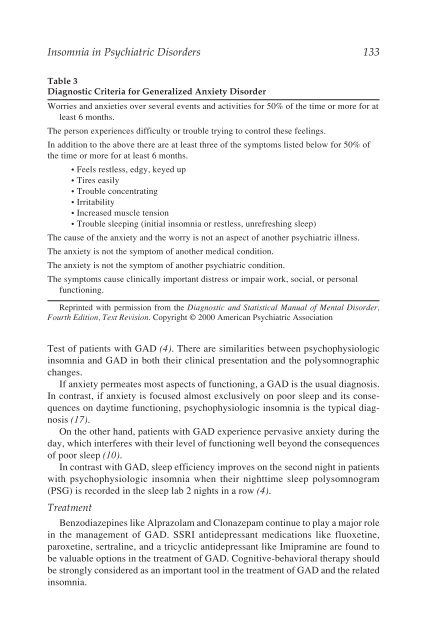Insomnia Insomnia
Insomnia Insomnia
Insomnia Insomnia
Create successful ePaper yourself
Turn your PDF publications into a flip-book with our unique Google optimized e-Paper software.
<strong>Insomnia</strong> in Psychiatric Disorders 133<br />
Table 3<br />
Diagnostic Criteria for Generalized Anxiety Disorder<br />
Worries and anxieties over several events and activities for 50% of the time or more for at<br />
least 6 months.<br />
The person experiences difficulty or trouble trying to control these feelings.<br />
In addition to the above there are at least three of the symptoms listed below for 50% of<br />
the time or more for at least 6 months.<br />
• Feels restless, edgy, keyed up<br />
• Tires easily<br />
• Trouble concentrating<br />
• Irritability<br />
• Increased muscle tension<br />
• Trouble sleeping (initial insomnia or restless, unrefreshing sleep)<br />
The cause of the anxiety and the worry is not an aspect of another psychiatric illness.<br />
The anxiety is not the symptom of another medical condition.<br />
The anxiety is not the symptom of another psychiatric condition.<br />
The symptoms cause clinically important distress or impair work, social, or personal<br />
functioning.<br />
Reprinted with permission from the Diagnostic and Statistical Manual of Mental Disorder,<br />
Fourth Edition, Text Revision. Copyright © 2000 American Psychiatric Association<br />
Test of patients with GAD (4). There are similarities between psychophysiologic<br />
insomnia and GAD in both their clinical presentation and the polysomnographic<br />
changes.<br />
If anxiety permeates most aspects of functioning, a GAD is the usual diagnosis.<br />
In contrast, if anxiety is focused almost exclusively on poor sleep and its consequences<br />
on daytime functioning, psychophysiologic insomnia is the typical diagnosis<br />
(17).<br />
On the other hand, patients with GAD experience pervasive anxiety during the<br />
day, which interferes with their level of functioning well beyond the consequences<br />
of poor sleep (10).<br />
In contrast with GAD, sleep efficiency improves on the second night in patients<br />
with psychophysiologic insomnia when their nighttime sleep polysomnogram<br />
(PSG) is recorded in the sleep lab 2 nights in a row (4).<br />
Treatment<br />
Benzodiazepines like Alprazolam and Clonazepam continue to play a major role<br />
in the management of GAD. SSRI antidepressant medications like fluoxetine,<br />
paroxetine, sertraline, and a tricyclic antidepressant like Imipramine are found to<br />
be valuable options in the treatment of GAD. Cognitive-behavioral therapy should<br />
be strongly considered as an important tool in the treatment of GAD and the related<br />
insomnia.


